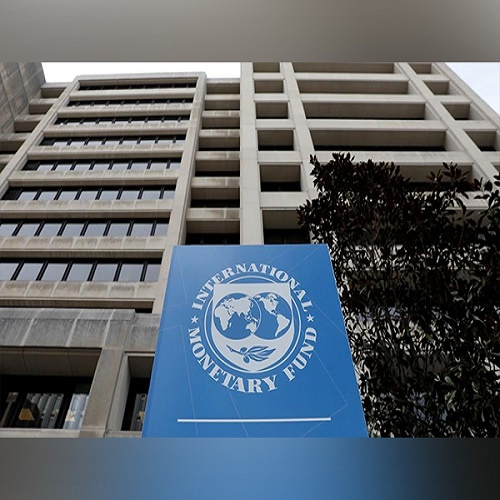Washington [US], April 12 (ANI): The International Monetary Fund (IMF) on Tuesday lowered its growth forecast for the global economy to 2.8 per cent and also said that the recovery of the global economy from both the pandemic and Russia’s invasion of Ukraine remains ‘on track’.
“China’s reopened economy is rebounding strongly. Supply chain disruptions are unwinding, while dislocations to energy and food markets caused by the war are receding. Simultaneously, the massive and synchronized tightening of monetary policy by most central banks should start to bear fruit, with inflation moving back towards targets,” IMF said in its statement.
It further added, “We forecast in our latest World Economic Outlook that growth will bottom out at 2.8 per cent this year before rising modestly to 3 per cent next year–0.1 percentage points below our January projections. Global inflation will fall, though more slowly than initially anticipated, from 8.7 per cent last year to 7 per cent this year and 4.9 per cent in 2024,” the IMF stated in the release.
IMF pointed out that the economic slowdown is mainly concentrated in the advanced economies, especially the euro area and the United Kingdom.
“The growth (in the region) is expected to fall to 0.8 per cent and -0.3 per cent this year before rebounding to 1.4 and 1 per cent respectively. By contrast, despite a 0.5 percentage point downward revision, many emerging market and developing economies are picking up, with year-end to year-end growth accelerating to 4.5 per cent in 2023 from 2.8 per cent in 2022,” it further stated.
However, IMF also pointed out that the situation remains fragile pertaining to the recent banking instability, downside risks and the thickening of the fog around world economic outlook.
“Inflation is much stickier than anticipated, even a few months ago. While global inflation has declined, that reflects mostly the sharp reversal in energy and food prices. But core inflation, which excludes energy and food, has not yet peaked in many countries. We expect year-end to year-end core inflation will slow to 5.1 per cent this year, a sizeable upward revision of 0.6 percentage points from our January update, and well above target,”
The IMF further said that since labour markets remain ‘very strong’ in most advanced economies, the activity is showing signs of resilience.
“At this point in the tightening cycle, we would expect to see more signs of output and employment softening. Instead, our output and inflation estimates have been revised upwards for the last two quarters, suggesting stronger-than-expected aggregate demand. This may call for monetary policy to tighten further or to stay tighter for longer than currently anticipated.
The body, however, expressed being unconvinced towards the risk of an uncontrolled wage-price spiral.
It also pointed out about the ‘side effects’ of sharp monetary policy on the financial sector
“Our World Economic Outlook explores a scenario where banks, faced with rising funding costs and the need to act more prudently, cut down lending further. This leads to an additional 0.3 per cent reduction in output this year,” it stated.
It pointed out several factors that might lead to the testing of the financial system even more severely.
“Nervous investors often look for the next weakest link, as they did with Credit Suisse, a globally systemic but ailing European bank. Financial institutions with excess leverage, credit risk or interest rate exposure, too much dependence on short-term funding, or located in jurisdictions with limited fiscal space could become the next target. So could countries with weaker perceived fundamentals,” the IMF stated.
“We are therefore entering a tricky phase during which economic growth remains lacklustre by historical standards, financial risks have risen, yet inflation has not yet decisively turned the corner,” the body added.
Regarding the policies, the IMF suggested a need for a steady hand and clear communication between the fiscal and monetary policies.
It suggested that monetary policy should remain focused on bringing inflation down, but also stand ready to quickly adjust to financial developments amid the instability.
“A silver lining is that the banking turmoil will help slow aggregate activity as banks curtail lending,” IMF stated.
IMF also suggested that fiscal policy can also play an active role by cooling off economic activity. It feels that a tighter fiscal policy would support monetary policy, allowing real interest rates to return faster to a low natural level.
Talking about the global projections, it said, “The five-year ahead growth projections declined steadily from 4.6 per cent in 2011 to 3 per cent in 2023”.
IMF further stressed that the world must avoid being in a ‘fragmented’ position at a time of global challenges.
“But some of the more recent slowdowns may also reflect more ominous forces: the scarring impact of the pandemic, a slower pace of structural reforms, as well as the rising and increasingly real threat of geo-economic fragmentation leading to more trade tensions, less direct investment and a slower pace of innovation and technology adoption across fragmented ‘blocks.’ A fragmented world is unlikely to achieve progress for all or to successfully tackle global challenges such as climate change or pandemic preparedness. We must avoid that path at all costs,” it further stated. (ANI)












